
 |

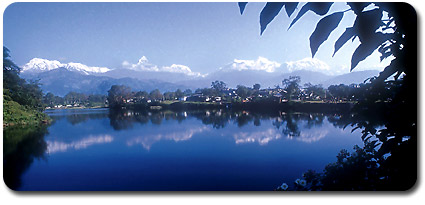 Pokhara
is a remarkable place of natural beauty. Situated at an altitude of
827m from the sea level and 200km west of Kathmandu valley, the city
is known as a center of adventure. This enchanting city has several
beautiful lakes and offers stunning panaromic views of Himalayan peaks.
The serenity of lakes and the magnificence of the Himalayas rising
behind them create an ambience of peace and magic. So today the city
has not only become the starting point for most popular trekking and
rafting destinations but also a place to relax and enjoy the beauty
of nature. Pokhara
is a remarkable place of natural beauty. Situated at an altitude of
827m from the sea level and 200km west of Kathmandu valley, the city
is known as a center of adventure. This enchanting city has several
beautiful lakes and offers stunning panaromic views of Himalayan peaks.
The serenity of lakes and the magnificence of the Himalayas rising
behind them create an ambience of peace and magic. So today the city
has not only become the starting point for most popular trekking and
rafting destinations but also a place to relax and enjoy the beauty
of nature. Pokhara is part of a once vibrant trade route extending between India and Tibet. To this day, mule trains can be seen camped on the outskirts of the town, bringing goods to trade from remote regions of the Himalaya. This is the land of Gurungs and Magars, hardworking farmers and valorous warriors who have earned worldwide fame as Gurkha soldiers. The Thakalis, another important ethnic group here, are known for their entrepreneurship. Climate: The activities of foreign visitors to Pokhara focus around two districts known as Damside and Lakeside (or Pardi and Baidam, in Nepali, respectively). These two areas, with their strips of hotels and restaurants, are a few kilometers south-west of the main Pokhara bazaar.
Flowing right through the city, the boisterous river runs completely underground at places. Amazingly, at certain points the river appears hardly two meters wide. But its depth is quite beyond imagination - over 20 meters! Mahendra Pul, a small bridge near the old Mission Hospital, provides a perfect view of the river's dreadful rush and the deep gorge made by its powerful flow.
Gupteswar Gupha, a sacred cave, lies 2 km from Pokhara airport on the Siddhartha Highway leading southwest from the city. The entrance is right across from Devi's Fall and the cave is almost 3 km long. It has some big hall-size rooms and some passages where you have to crawl on all fours. This cave holds special value for Hindus since a phallic symbol of Lord Shiva is preserved here in the condition it was discovered. An entrance fee of Rs. 5 is charged and taking pictures inside the cave is prohibited.
The
Old Bazaar Pokhara's traditional bazaar is colorful and so are its ethnically diverse traders. In its temples and monuments can be seen ties to the Newar architecture of the Kathmandu Valley. Located about 4 km from Lakeside, the market's original charm is alive and well.
Bindhyabasini temple is the center of religious activity in the old bazaar. It is dedicated to goddess Bhagwati, yet another manifestation of shakti. Worshippers flock here to perform sacrifices, and especially on Saturdays the parklike grounds take on a festive fair. Matepani Gumba (Buddhist Monastry) There is a splendid Buddhist Monastry on the top of the small forested hill above Matepani east of Mahendra pool. It overlooks a large section of the Pokhara city and once there on find oneself lost in time amid the chanting Ramas, there colossal guardian images of the Buddha accompanying two other gurus and a prayer house with exquisitely carved columns and friezes. To the south of the Buddhist Monastery there is another small but beautiful hill and in this pleasant sylvan setting lies Bhadrakali temple which also merits a visit.
Pokhara Museum, located between the airport and Mahendra Pul, reflects the ethnic mosaic of western Nepal. The lifestyles and history of ethnic groups such as the Gurung, Thakali and the Tharu are attractively displayed. Open daily, except Tuesdays and holidays, from 10 am to 4 pm. Entrance fee is Rs. 5 and there is an extra Rs. 10 for cameras (Tel: 0612041 3). Annapurna Museum, also known as the Natural History Museum, is located at Prithvi Narayan Campus east of the old bazaar. Managed by the Annapurna Conservation Area Project (ACAP), the museum has an exceptional collection of butterflies, insects, birds, and models of wildlife as well as samples of various precious and semi-precious stones and volcanic rocks. Open daily, except Saturdays and holidays, from 9 am to 4 pm. Entrance is free (Tel: 061-21102).
Himalayan View
Nightlife and
Entertainment
Around Pokhara
For those with less time, Pokhara also provides shorter (one to seven days) more leisurely treks around the neighboring hills and villages. The popular ones are: Ghachowk Trek: two days, a circuit through Lhachowk to Ghachowk and down to Batulechaur, north of Pokhara, close up view of Fishtail mountain. Naudanda Trek: two days, to Naudanda
from Suikhet and then back through Kaski, west of Pokhara. Kahun Danda: day trip, north east
of Pokhara, 1560m altitude. Rupa and Begnas Lakes: day trip, 15km south-east of Pokhara, take a bus there and leisurely walk along the ridge that separates the two twin lakes. |
|
|||||||||||||||
|
|||||||||||||||
|
|||||||||||||||
 |
 Phewa
lake, the second largest lake in the kingdom, roughly measuring
1.5 km by 4 km, is the center of all attractions in Pokhara. The
enchanting lake is an idyllic playground. Brightly painted wooden
boats and sailboats can be rented on reasonable cost around lakeside.
Phewa
lake, the second largest lake in the kingdom, roughly measuring
1.5 km by 4 km, is the center of all attractions in Pokhara. The
enchanting lake is an idyllic playground. Brightly painted wooden
boats and sailboats can be rented on reasonable cost around lakeside.
 The
lakes are located about 15km from Pokhara at the end of a road that
turns north from the highway to Kathmandu. Divided by the forested
hillock called Panchabhaiya Danda, the lakes offer the perfect nature
retreat because of their relative seclusion. Splendid boating and
fishing can be done here.
The
lakes are located about 15km from Pokhara at the end of a road that
turns north from the highway to Kathmandu. Divided by the forested
hillock called Panchabhaiya Danda, the lakes offer the perfect nature
retreat because of their relative seclusion. Splendid boating and
fishing can be done here.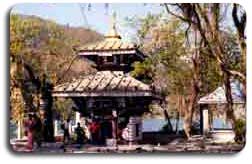 This
is the most important religious monument in Pokhara. Built almost
in the middle of Phewa lake, the two storied pagoda is dedicated
to the boar manifestation of Ajima, the protectress deity representing
the female force Shakti. Devotees can be seen, especially on Saturdays,
carrying male animals and fowl across the lake to be sacrificed
to the deity.
This
is the most important religious monument in Pokhara. Built almost
in the middle of Phewa lake, the two storied pagoda is dedicated
to the boar manifestation of Ajima, the protectress deity representing
the female force Shakti. Devotees can be seen, especially on Saturdays,
carrying male animals and fowl across the lake to be sacrificed
to the deity.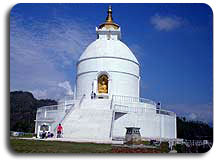 The
pagoda is a massive Buddhist stupa and is situated on top of a hill
on the southern shore of Phewa lake. Besides being an impressive
sight in itself, the shrine is a great vantage point which offers
spectacular views of the Annapurna range and Pokhara city. You can
get there by crossing the lake by boat and then hiking up the hill.
The
pagoda is a massive Buddhist stupa and is situated on top of a hill
on the southern shore of Phewa lake. Besides being an impressive
sight in itself, the shrine is a great vantage point which offers
spectacular views of the Annapurna range and Pokhara city. You can
get there by crossing the lake by boat and then hiking up the hill.
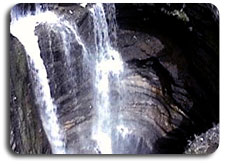 Locally
known as Patale Chhango (Hell's Fall), Devi's fall (also known as
Devin's or David's) is an awesome waterfall lying about 2 km south-west
of Pokhara airport on the highway to Tansen. An interesting modern
legend says that a foreigner named David was skinnydipping in the
Pardi Khola (river) when the floodgates of the dam were opened,
sweeping him into an underground passage beneath the fall, never
to be seen again.
Locally
known as Patale Chhango (Hell's Fall), Devi's fall (also known as
Devin's or David's) is an awesome waterfall lying about 2 km south-west
of Pokhara airport on the highway to Tansen. An interesting modern
legend says that a foreigner named David was skinnydipping in the
Pardi Khola (river) when the floodgates of the dam were opened,
sweeping him into an underground passage beneath the fall, never
to be seen again. 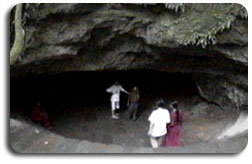 Mahendra
Gufa, locally called Chamero Odhaar ("House of Bats"),
is the large limestone cave. Shepherd boys are said to have discovered
it around 1950. A two hour walk to the north of Pokhara, it is best
to bring your own torch to see the stalactites and stalagmites,
although most of them have been carted out by souvenir hunters.
Mahendra
Gufa, locally called Chamero Odhaar ("House of Bats"),
is the large limestone cave. Shepherd boys are said to have discovered
it around 1950. A two hour walk to the north of Pokhara, it is best
to bring your own torch to see the stalactites and stalagmites,
although most of them have been carted out by souvenir hunters.
 (Ganesh tole and Ram Krishna Tole)
(Ganesh tole and Ram Krishna Tole)  The
magnificent Annapurna panorama that's visible on the northern skyline
of Pokhara is quite incredible. The main peaks are Annapurna I to
IV and the beautiful Machhapuchhare (or Fishtail Mountaian, so named
after its twin peaks). Besides these, you can also see the Himchuli,
Varahashikhar, Gangapurna and other peaks. The
The
magnificent Annapurna panorama that's visible on the northern skyline
of Pokhara is quite incredible. The main peaks are Annapurna I to
IV and the beautiful Machhapuchhare (or Fishtail Mountaian, so named
after its twin peaks). Besides these, you can also see the Himchuli,
Varahashikhar, Gangapurna and other peaks. The  Pokhara
is the starting and ending point for many of the popular trekking
routes in Nepal. Longer treks (one to three week long) such as the
Jomsom trek, Annapurna Circuit, and Annapurna Sanctuary begin here.
Check a book on Nepal trekking for more details on this. Otherwise,
you can also visit this site Pilgrims Book House for information
on trekking books of Nepal.
Pokhara
is the starting and ending point for many of the popular trekking
routes in Nepal. Longer treks (one to three week long) such as the
Jomsom trek, Annapurna Circuit, and Annapurna Sanctuary begin here.
Check a book on Nepal trekking for more details on this. Otherwise,
you can also visit this site Pilgrims Book House for information
on trekking books of Nepal.